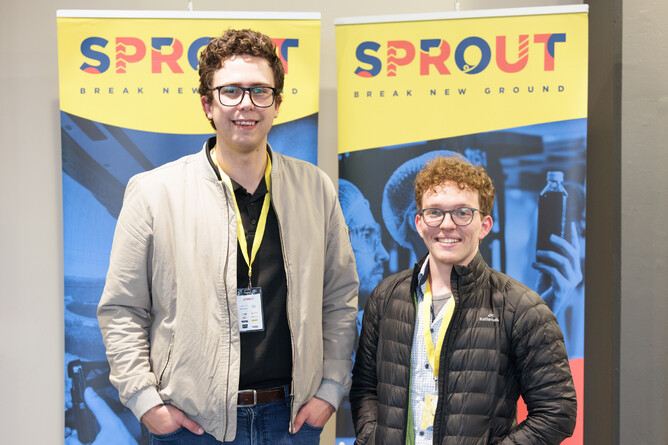Mastitis costs the New Zealand dairy industry millions of dollars in losses each year. Teat spraying after milking has been proven to reduce the incidence of new mastitis infections by 50%. But if done incorrectly that impact is decreased.
Through the power of AI one New Zealand start-up is looking to change the automatic teat spraying game for good.
Meet Benedict Johnson and Chris Scherman, co-founders of AgriAI. They are one of the ventures taking part in our three-month Sprout 2023 Accelerator in the Cohort XI intake.
Leveraging cutting-edge machine learning and computer vision technologies to revolutionise agriculture, the team at AgriAI want to help shape the future of farming through automation and data-driven insights.
Benedict and Chris describe themselves as ambitious, cohesive and persistent as a duo and are out to improve the efficiency of teat spraying through targeted application.
Benedict has a strong background in mechatronics and a commitment to creating cutting-edge products that are reliable and robust. Coupled with a childhood spent on a dairy farm, it’s no wonder he’s merged the two into this venture.
“Engineering has shaped my expertise. Over the last three years I’ve accumulated hands-on experience in prototype development, specialising in mechanical design,” said Benedict.
Chris has an honours degree from the University of Waikato in electronic engineering and has crafted the machine learning algorithm that formed the basis of the end product for AgriAI.
“Thinking outside the box and ensuring we have both innovative and effective solutions to put out into the world is important to both of us.”
Dairy farmers often grapple with the challenge of ensuring a consistent and accurate teat spraying method for cows post-milking. The duo say that relying on manual processes is not only time-consuming, but it introduces human errors and inconsistencies.
“Without around-the-clock precision, inconsistent or insufficient spraying can lead to compromises in milk quality and well-being of livestock, ultimately leading to financial losses for farmers,” said Benedict.
They were surprised during their market research phase to see how current automatic teat spraying systems were sensor-based systems.
“These sensor-based systems often result in inaccurate and inconsistent spray coverage. They’re quite limited technologically speaking but they come at a high market value. This indicates that there is a significant opportunity for us to improve and innovate in this space,” said Chris.
Reflecting on their journey so far, Chris and Benedict agree that by far their most satisfying moment to date was when they got their AI teat spraying working for the very first time.
“We also got really good feedback on our prototypes at Fieldays this year which really gave us a little push we needed to keep going,” said Benedict.
“During the process of putting this together, you can experience something called integration hell. So getting the sprayer working that first time we were just over the moon.”
While there is still a wee way to go before their products are out on farms, Chris and Benedict are aiming big with their aspirations. They want to bring AI to agriculture and become the top choice for farmers and industry professionals in New Zealand and the globe. They also have their eye tentatively set on incorporating AI in other areas of agriculture using the same processing module.
“Our next big move is getting the first product equipped with a camera processing module and get it out to market. Sprout is a huge part of this next phase for us in the form of creating connections and getting valuable advice on what the next phase should look like,” said Chris.
Having found a niche point in the industry that's ripe for some fresh ideas, Chris and Benedict are enjoying turning their ideas into reality and creating the potential for real impact on the day-to-day lives of people.
Driven by the desire to help people and inspired daily by the people that they want to help, the duo are set for a bright future in an industry whose future is dependent on growing technologies.

